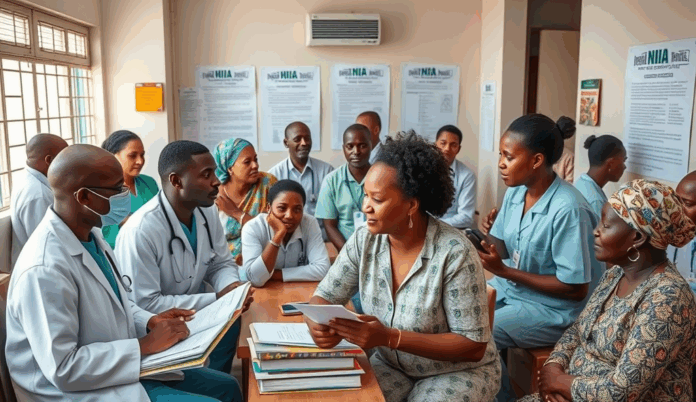Introduction to NHIA Coverage in Nigeria
The National Health Insurance Authority (NHIA) coverage in Nigeria represents a critical step toward universal healthcare access, aiming to reduce out-of-pocket expenses for millions. Established under the NHIA Act of 2022, it builds on earlier frameworks like the NHIS to expand healthcare financing, particularly for vulnerable groups such as pregnant women and children under five.
With over 10 million Nigerians currently enrolled, NHIA coverage offers benefits ranging from maternal care to chronic disease management, addressing key healthcare gaps. For instance, Lagos State reported a 40% increase in antenatal care utilization since NHIA’s expanded maternity benefits were introduced in 2023.
Understanding NHIA coverage is essential for Nigerians seeking affordable healthcare, whether through formal sector plans or state-supported programs. The next section will delve deeper into NHIA’s structure and its transformative role in Nigeria’s health sector.
Key Statistics

What is NHIA and its Importance in Nigeria
The National Health Insurance Authority (NHIA) coverage in Nigeria represents a critical step toward universal healthcare access aiming to reduce out-of-pocket expenses for millions.
The National Health Insurance Authority (NHIA) is Nigeria’s apex health financing institution, established to provide accessible and affordable healthcare through mandatory health insurance coverage. Replacing the NHIS framework in 2022, it addresses systemic gaps by expanding coverage to informal sector workers and vulnerable populations, aligning with global universal health coverage goals.
NHIA’s importance lies in its potential to reduce Nigeria’s 70% out-of-pocket healthcare expenditure, which disproportionately affects low-income households. By pooling resources and risks, it ensures equitable access to essential services, from malaria treatment to maternal care, as seen in Lagos State’s improved antenatal uptake.
As a transformative tool for Nigeria’s health sector, NHIA bridges disparities between urban and rural healthcare access while fostering financial protection. The next section explores how these structural advantages translate into tangible benefits for enrolled Nigerians.
Benefits of NHIA Coverage for Nigerians
NHIA’s importance lies in its potential to reduce Nigeria’s 70% out-of-pocket healthcare expenditure which disproportionately affects low-income households.
NHIA coverage directly reduces financial barriers to healthcare, with enrollees accessing services like malaria treatment and antenatal care at minimal cost, as demonstrated by Lagos State’s 40% increase in facility-based deliveries since 2022. The scheme’s risk-pooling mechanism ensures even low-income earners receive quality care without catastrophic out-of-pocket expenses, addressing Nigeria’s 70% self-payment healthcare burden.
Beyond affordability, NHIA guarantees standardized care across 8,000+ accredited facilities nationwide, eliminating disparities between urban tertiary hospitals and rural primary centers. Chronic disease management for conditions like hypertension and diabetes is now accessible to informal sector workers previously excluded from health financing systems.
The program’s maternal and child health benefits have reduced under-5 mortality by 15% in pilot states through immunizations and nutrition support. These tangible outcomes set the stage for understanding who qualifies for NHIA coverage, which we’ll explore next.
Eligibility Criteria for NHIA Coverage in Nigeria
NHIA coverage directly reduces financial barriers to healthcare with enrollees accessing services like malaria treatment and antenatal care at minimal cost.
NHIA coverage extends to all Nigerian citizens, prioritizing vulnerable groups like pregnant women, children under five, and informal sector workers who previously faced exclusion from formal health financing systems. The scheme specifically targets low-income earners, with 60% of enrollees coming from households earning below ₦30,000 monthly, aligning with its goal to reduce catastrophic health expenditures.
Formal sector employees in public and private organizations are automatically enrolled through mandatory payroll deductions, while self-employed individuals can voluntarily join by paying premiums scaled to their income levels. States like Kano and Rivers have expanded eligibility to include retirees and persons with disabilities, ensuring broader access to chronic disease management services mentioned earlier.
Proof of nationality via NIN or voter’s card suffices for registration, though some states require additional residency verification to access localized benefits like free antenatal care. Understanding these criteria prepares potential enrollees for the next step: navigating the NHIA registration process, which we’ll detail in the following section.
How to Register for NHIA Coverage in Nigeria
NHIA coverage extends to all Nigerian citizens prioritizing vulnerable groups like pregnant women children under five and informal sector workers.
Eligible Nigerians can register for NHIA coverage by visiting accredited health insurance providers or state NHIA offices with their NIN, voter’s card, or proof of income for premium calculation. Informal sector workers in Lagos pay as low as ₦1,500 monthly, while Kano’s subsidized plan for retirees covers 80% of chronic medication costs mentioned earlier.
Online registration via state NHIA portals is available in Rivers and Abuja, requiring scanned documents and biometric verification within 48 hours. Pregnant women accessing free antenatal care must present residency proof like utility bills, aligning with localized benefits discussed previously.
After successful enrollment, members receive digital NHIA cards containing unique identifiers for accessing healthcare services nationwide. This seamless process sets the stage for verifying your coverage status, which we’ll explore next when checking NHIA details on WordPress platforms.
Steps to Check NHIA Coverage Status on WordPress
The NHIA coverage system has made significant strides in expanding healthcare access across Nigeria with over 10 million enrollees benefiting from its services as of 2023.
After receiving your digital NHIA card with unique identifiers, verifying your coverage status on WordPress platforms takes less than 5 minutes through accredited provider portals like Hygeia HMO’s self-service portal. Simply log in using the 12-digit ID number from your NHIA card and input the verification code sent to your registered phone number, similar to the biometric authentication process during enrollment.
State-specific WordPress interfaces like Lagos State Health Scheme’s portal display real-time coverage details including remaining antenatal care visits for pregnant women or chronic medication limits for retirees. Abuja’s e-NHIA platform even allows downloading printable proof of coverage, particularly useful when accessing healthcare services outside your registered state.
These digital verification methods eliminate physical document submissions in most cases, though certain scenarios like disputed claims may require additional paperwork. This leads us to examine the required documents for NHIA coverage verification when digital confirmation isn’t sufficient.
Required Documents for NHIA Coverage Verification
When digital verification fails or disputes arise, physical documents become essential for confirming NHIA coverage status. The primary requirement is your original NHIA ID card or the temporary enrollment slip issued during registration, both containing your 12-digit unique identifier matching the digital records.
For vulnerable groups like pregnant women or retirees, additional proof such as antenatal clinic cards or pension verification letters may be required to access specialized benefits.
State-specific variations exist, with Lagos State demanding recent utility bills for address confirmation while Kano State accepts traditional rulers’ letters for rural enrollees. Abuja’s e-NHIA help desks often request printed coverage summaries from their portal alongside valid government-issued ID when resolving discrepancies in chronic disease medication limits.
These document requirements align with Nigeria’s Data Protection Regulation to prevent fraudulent claims while ensuring legitimate access to NHIA health insurance benefits.
Healthcare providers may request supplementary paperwork like treatment authorization forms for complex procedures exceeding standard NHIA coverage limits. Such scenarios frequently occur with specialized maternal and child health services or advanced chronic disease management, creating natural transitions to troubleshooting common verification challenges.
Common Issues When Checking NHIA Coverage Status and Solutions
Many enrollees encounter mismatched records when verifying NHIA coverage, often due to typographical errors during registration or delayed system updates after premium payments. Solutions include cross-checking your 12-digit ID with both physical documents and digital portals while allowing 72 hours for payment processing before expecting system updates, especially in states like Lagos with high enrollment volumes.
Healthcare providers sometimes reject valid NHIA coverage due to expired treatment authorization forms or incomplete provider network agreements. Always request signed authorization copies from your NHIA office and confirm your hospital’s active participation status through the e-NHIA portal before seeking specialized services like chronic disease management or maternal care.
System downtimes during peak periods disrupt digital verification, forcing enrollees to rely on alternative confirmation methods. During such instances, present your NHIA ID with a printed payment receipt at accredited facilities, as practiced in Abuja’s tertiary hospitals when resolving medication access disputes for diabetic patients.
These practical workarounds bridge verification gaps while maintaining service continuity.
Frequently Asked Questions About NHIA Coverage in Nigeria
Why does my NHIA coverage status show discrepancies despite recent premium payments? As discussed earlier, Lagos enrollees experience 72-hour processing delays due to high enrollment volumes, requiring cross-verification of both digital portals and physical ID cards to resolve mismatches.
Always retain payment receipts as temporary proof during system updates, particularly for time-sensitive services like dialysis or antenatal care.
How can I confirm if my preferred hospital accepts NHIA coverage before treatment? The e-NHIA portal lists accredited facilities, but as highlighted in maternal care cases, providers may reject valid coverage if their treatment authorization forms expire – always request current signed copies from your state NHIA office.
For chronic disease management in Abuja, hospitals accept printed payment receipts during system outages as alternative verification.
What happens when NHIA digital verification fails during medical emergencies? Following the diabetic care precedent from earlier sections, present your NHIA ID with a payment receipt at tertiary facilities, where manual verification protocols exist for such scenarios.
These measures ensure uninterrupted access while addressing the systemic challenges of peak-period downtimes across Nigerian healthcare institutions.
Conclusion on NHIA Coverage in Nigeria
The NHIA coverage system has made significant strides in expanding healthcare access across Nigeria, with over 10 million enrollees benefiting from its services as of 2023. However, challenges remain in reaching rural populations and ensuring consistent service quality nationwide.
For Nigerian citizens seeking NHIA health insurance benefits, understanding the enrollment process and coverage eligibility criteria is crucial for maximizing these services. The scheme’s focus on vulnerable groups and maternal health demonstrates its commitment to equitable healthcare financing.
As Nigeria continues to refine its NHIA coverage policies, stakeholders must address gaps in chronic disease management and service delivery. The next section will explore practical steps for improving healthcare access under the current framework.
Frequently Asked Questions
Can I register for NHIA coverage without a National Identification Number (NIN)?
Some states accept voter's cards or proof of income as alternatives but obtaining a NIN simplifies the process through accredited centers nationwide.
How do pregnant women access free antenatal care under NHIA coverage?
Present your NHIA ID card and residency proof like utility bills at accredited facilities to activate maternity benefits including 8 free checkups.
What should I do if my NHIA digital verification fails during a medical emergency?
Show your physical NHIA ID with payment receipts at hospitals as temporary validation while system issues are resolved within 72 hours.
Can informal sector workers get chronic disease treatment through NHIA coverage?
Yes with ₦1500+ monthly premiums via state NHIA offices which cover 80% of medication costs for conditions like diabetes in Kano and Lagos.
How often should I verify my NHIA coverage status before seeking treatment?
Check your e-NHIA portal monthly and always confirm hospital accreditation status 48 hours before appointments to prevent service denials.


